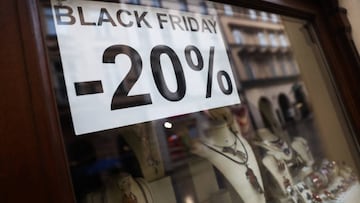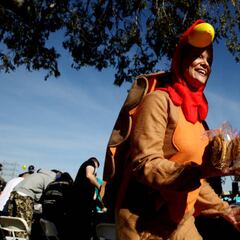Are banks open on Black Friday 2022? Opening and closing times
Banks and businesses around the country will be closing their doors for Thanksgiving, but does the same happen on Black Friday?

Black Friday is now considered an integral part of Thanksgiving celebrations for millions of people; marking the start of the build-up to Christmas and a shopping bonanza of cut-price deals and tasty offers. However, Black Friday is not a federal holiday.
As such, businesses do not give employees the day off as standard and federally-organised services, such as schools, the US Postal Service and public parks will all follow normal operating hours. Banks will be open as normal on Black Friday, though the vast majority will be closed the day before for Thanksgiving.
me when I get yet another Black Friday email pic.twitter.com/IOrp8iqvRl
— Tom Warren (@tomwarren) November 23, 2022
Many credit unions will be closed on Black Friday
Almost all banks align their operating days with the federal holiday calendar, but credit unions and other financial institutions do not necessarily follow suit.
Consumer advice site GoBankingRates confirms that the following credit unions will be closed on Black Friday this year:
- Members Credit Union;
- Mobiloil Credit Union;
- Signature Federal Credit Union;
- Teachers Credit Union;
- Unify Financial Credit Union;
- Welcome Federal Credit Union.
Other private businesses may opt to give employees the day off on Black Friday to take advantage of the biggest shopping day of the year.
Related stories:
What is the history of Black Friday?
The term Black Friday is now associated with the post-Thanksgiving shopping surge, but the phrase actually has its roots in a 19th century financial crisis when two ruthless Wall Street financiers attempted to push up the national price of gold before selling up their huge reserves and pocketing the profits.
Jay Gould and Jim Fisk had planned to buy up as much of the nation’s gold as possible, creating a shortage and pushing up the price, before dumping what they owned at the inflated price. But the conspiracy was revealed on Friday, 24 September 1896 and sending Wall Street into a tailspin, with disastrous consequences for everyone from CEOs to countryside farmers.
Related stories
The term was then appropriated in the 1950s when police in Philadelphia reportedly used it to describe the chaotic and sometimes violent scenes when shoppers and tourists flooded the city for the annual post-Thanksgiving Army-Navy football match.
Black Friday?
— Greenpeace Aotearoa (@GreenpeaceNZ) November 24, 2022
Everything you want is just a click away... or not?
Remember: saving the planet is the best deal! #BlackFriday pic.twitter.com/LCZlqkiB2g
The term caught on and it became a general term for the post-Thanksgiving bedlam across the country, and was soon picked up by savvy marketing executives to build up the hype around the one-day shopping event.

